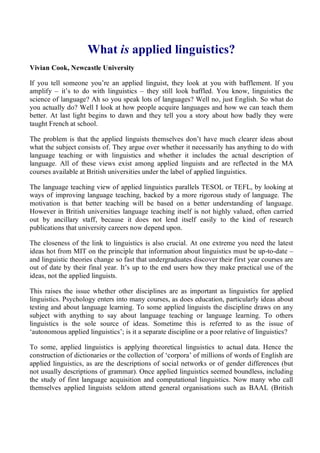
What is applied linguistics
- 1. What is applied linguistics? Vivian Cook, Newcastle University If you tell someone you’re an applied linguist, they look at you with bafflement. If you amplify – it’s to do with linguistics – they still look baffled. You know, linguistics the science of language? Ah so you speak lots of languages? Well no, just English. So what do you actually do? Well I look at how people acquire languages and how we can teach them better. At last light begins to dawn and they tell you a story about how badly they were taught French at school. The problem is that the applied linguists themselves don’t have much clearer ideas about what the subject consists of. They argue over whether it necessarily has anything to do with language teaching or with linguistics and whether it includes the actual description of language. All of these views exist among applied linguists and are reflected in the MA courses available at British universities under the label of applied linguistics. The language teaching view of applied linguistics parallels TESOL or TEFL, by looking at ways of improving language teaching, backed by a more rigorous study of language. The motivation is that better teaching will be based on a better understanding of language. However in British universities language teaching itself is not highly valued, often carried out by ancillary staff, because it does not lend itself easily to the kind of research publications that university careers now depend upon. The closeness of the link to linguistics is also crucial. At one extreme you need the latest ideas hot from MIT on the principle that information about linguistics must be up-to-date – and linguistic theories change so fast that undergraduates discover their first year courses are out of date by their final year. It’s up to the end users how they make practical use of the ideas, not the applied linguists. This raises the issue whether other disciplines are as important as linguistics for applied linguistics. Psychology enters into many courses, as does education, particularly ideas about testing and about language learning. To some applied linguists the discipline draws on any subject with anything to say about language teaching or language learning. To others linguistics is the sole source of ideas. Sometime this is referred to as the issue of ‘autonomous applied linguistics’; is it a separate discipline or a poor relative of linguistics? To some, applied linguistics is applying theoretical linguistics to actual data. Hence the construction of dictionaries or the collection of ‘corpora’ of millions of words of English are applied linguistics, as are the descriptions of social networks or of gender differences (but not usually descriptions of grammar). Once applied linguistics seemed boundless, including the study of first language acquisition and computational linguistics. Now many who call themselves applied linguists seldom attend general organisations such as BAAL (British
- 2. Association of Applied Linguistics) but go to more specialist conferences such as EUROSLA (European Second Language Association) for second language acquisition (SLA) or MATSDA (Materials Development Association) for materials construction. To many, however, applied linguistics has become synonymous with SLA (though never linked to first language acquisition). SLA research has had an enormous growth over the past decades. It enters into all of the above debates. Some people are concerned with classroom language acquisition because of its teaching implications, ; drawing mostly on psychological models of language and language processing and on social models of interaction and identity; others are concerned with SLA in natural settings. On another dimension, SLA can be seen as providing data to test out linguistic theories rather than to increase our knowledge of SLA itself; they are then more like linguists who happen to use SLA data than investigators of SLA in its own right. On a third dimension the linguistic world is more or less divided between those who see language as masses of things people have said and those who see it as knowledge in people’s minds. Some SLA researchers analyse large corpora of learner’s utterances or essays; others test their ideas against the barest minimum of data; neither side really accept that the other has a valid point of view. Applied linguistics then means many things to many people. Discovering what a book or a course in applied linguistics is about involves reading the small print to discover its orientation. Those with an interest in linguistic theory are going to feel frustrated when bombarded with classroom teaching techniques; those who want to handle large amounts of spoken or written data will be disappointed by single example sentences or experiments. Of course many people discover unexpected delights. One of my students who came to an MA course as an EFL course-writer ended up doing a Ph.D. thesis and book on learnability theory. This does not mean that most prospective MA students should not look very carefully, say checking the titles of the modules that actually make up the degree scheme, before they back a particular horse. SLA Topics SLA Bibliography Vivian Cook Obscure Writing SLL & LT Website